In the name of Allah, the Beneficent, the Merciful.
[50.1] Qaf. I swear by the glorious Quran (that Muhammad is the Apostle of Allah.)
[50.2] Nay! they wonder that there has come to them a warner from among themselves, so the unbelievers say: This is a wonderful thing:
[50.3] What! when we are dead and have become dust? That is afar (from probable) return.
[50.4] We know indeed what the earth diminishes of them, and with Us is a writing that preserves.
[50.5] Nay, they rejected the truth when it came to them, so they are (now) in a state of confusion.
[50.6] Do they not then look up to heaven above them how We have made it and adorned it and it has no gaps?
[50.7] And the earth, We have made it plain and cast in it mountains and We have made to grow therein of all beautiful kinds,
[50.8] To give sight and as a reminder to every servant who turns frequently (to Allah).
[50.9] And We send down from the cloud water abounding in good, then We cause to grow thereby gardens and the grain that is reaped,
[50.10] And the tall palm-trees having spadices closely set one above another,
[50.11] A sustenance for the servants, and We give life thereby to a dead land; thus is the rising.
[50.12] (Others) before them rejected (prophets): the people of Nuh and the dwellers of Ar-Rass and Samood,
[50.13] And Ad and Firon and Lut's brethren,
[50.14] And the dwellers of the grove and the people of Tuba; all rejected the apostles, so My threat came to pass.
[50.15] Were We then fatigued with the first creation? Yet are they in doubt with regard to a new creation.
[50.16] And certainly We created man, and We know what his mind suggests to him, and We are nearer to him than his life-vein.
[50.17] When the two receivers receive, sitting on the right and on the left.
[50.18] He utters not a word but there is by him a watcher at hand.
[50.19] And the stupor of death will come in truth; that is what you were trying to escape.
[50.20] And the trumpet shall be blown; that is the day of the threatening.
[50.21] And every soul shall come, with it a driver and a witness.
[50.22] Certainly you were heedless of it, but now We have removed from you your veil, so your sight today is sharp.
[50.23] And his companions shall say: This is what is ready with me.
[50.24] Do cast into hell every ungrateful, rebellious one,
[50.25] Forbidder of good, exceeder of limits, doubter,
[50.26] Who sets up another god with Allah, so do cast him into severe chastisement.
[50.27] His companion will say: Our Lord! I did not lead him into inordinacy but he himself was in a great error.
[50.28] He will say: Do not quarrel in My presence, and indeed I gave you the threatening beforehand:
[50.29] My word shall not be changed, nor am I in the least unjust to the servants.
[50.30] On the day that We will say to hell: Are you filled up? And it will say: Are there any more?
[50.31] And the garden shall be brought near to those who guard (against evil), not far off:
[50.32] This is what you were promised, (it is) for every one who turns frequently (to Allah), keeps (His limits);
[50.33] Who fears the Beneficent God in secret and comes with a penitent heart:
[50.34] Enter it in peace, that is the day of abiding.
[50.35] They have therein what they wish and with Us is more yet.
[50.36] And how many a generation did We destroy before them who were mightier in prowess than they, so they went about and about in the lands. Is there a place of refuge?
[50.37] Most surely there is a reminder in this for him who has a heart or he gives ear and is a witness.
[50.38] And certainly We created the heavens and the earth and what is between them in six periods and there touched Us not any fatigue.
[50.39] Therefore be patient of what they say, and sing the praise of your Lord before the rising of the sun and before the setting.
[50.40] And glorify Him in the night and after the prayers.
[50.41] And listen on the day when the crier shall cry from a near place
[50.42] The day when they shall hear the cry in truth; that is the day of coming forth.
[50.43] Surely We give life and cause to die, and to Us is the eventual coming;
[50.44] The day on which the earth shall cleave asunder under them, they will make haste; that is a gathering together easy to Us.
[50.45] We know best what they say, and you are not one to compel them; therefore remind him by means of the Quran who fears My threat.
